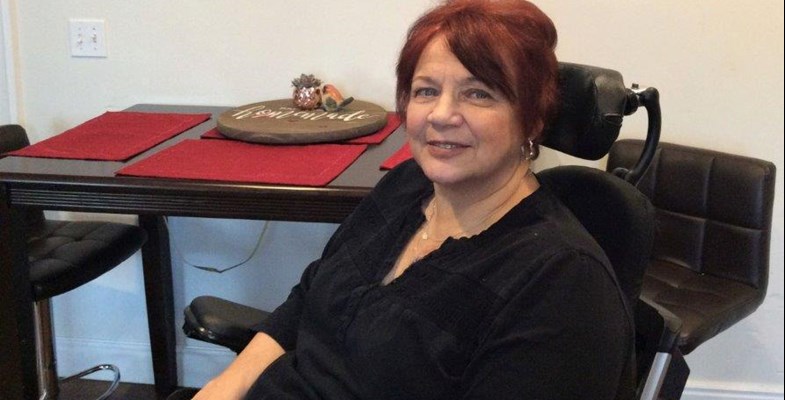Betty describes herself as an active, “never been a sitting around” type of person. After graduating from Western Connecticut State University, having a career in human resources, creating a home for her family and enjoying her hobbies, life took a downward turn. Complications from diabetes led to a stroke and a single leg amputation 8 years ago followed by two years living in a skilled nursing facility. While in the nursing facility, Betty experienced more than physical losses. Her mother and brother died and she could not attend the funerals due to lack of suitable transportation.
The rehabilitation department at the nursing facility suggested Money Follows the Person (MFP) to assist her in transitioning back into the community. Although excited, Betty was fearful and anxious, having to begin again. Betty just wanted a place that felt like home and had two requests when it came to finding housing: a place where she could garden and a place where her grandsons, “the light of her life,” could visit freely. Since 2014, Betty’s MFP transition team (the housing coordinator, the transition coordinator and care manager) continues to work with her. The MFP housing coordinator was able to find Betty an end unit, which provided her with a bigger yard. Now, she looks out her bedroom window to a lovely bird feeder and raised garden beds, where she grows carrots and tomatoes. She enlists her grandsons to help and now they can visit her in an environment where they can play outside. The apartment is not only wheelchair accessible with wider doorways, and a roll-in shower, but the MFP team were instrumental in finding special medical equipment, like a Rifton transfer lift, assistive technology for her vision loss and environmental controls for greater independence to control the lights and fan.
Betty has adjusted well to “the new normal.” She continues to stay active and involved in her community. Utilizing transportation provided by Ability Beyond, she is able to attend her grandsons’ basketball and football games, concerts in town, and nearby shopping centers. Due to her central location and level of independence, she is also able to take herself downtown and to her alma mater, WCSU’s campus to get some fresh air. Betty enjoys giving back to her community, crocheting for charities. Every year she donates 25-30 hats to homeless shelters and 10-20 infant hat and blanket sets to Birthright, an organization that helps single mothers. Betty continues on a path of self-improvement and staying positive in her life. She enjoys attending a free all-day retreat at a Buddhist Monastery in New York, which brings her comfort and strength. She also visited the family plots at the cemetery to find closure with her losses.
Both Betty and the MFP team admit to having a rocky start, with lots of staff turnover. Betty’s advice to others who have to hire their own Personal Care Assistants (PCAs) is to go by word of mouth and know someone who has worked with an aide and trusts them. Betty self manages PCAs for over 80 hours a week and has learned to juggle PCA and Independent Living Skills Training (ILST) worker hours within her budget. Over the past four months, Betty has undergone 4 surgeries, including a second leg amputation. “MFP has changed my life!” Having the aides in place after her surgeries allowed her to go back home where she received in-home and then outpatient services. “I don’t see any reason I should ever have to go to a nursing home again.”
Read the CT Money Follows the Person Quarterly Report
Add to Favorites
